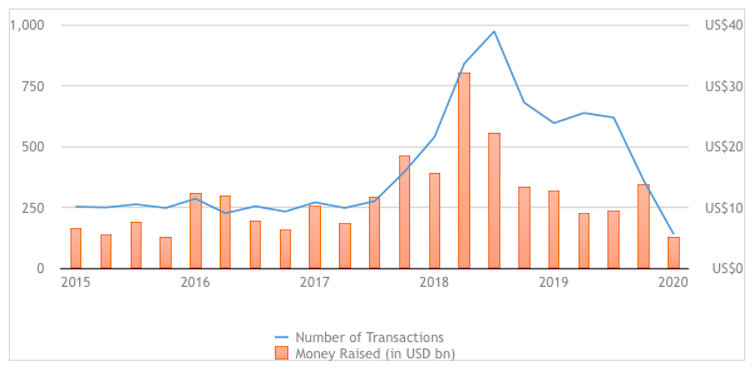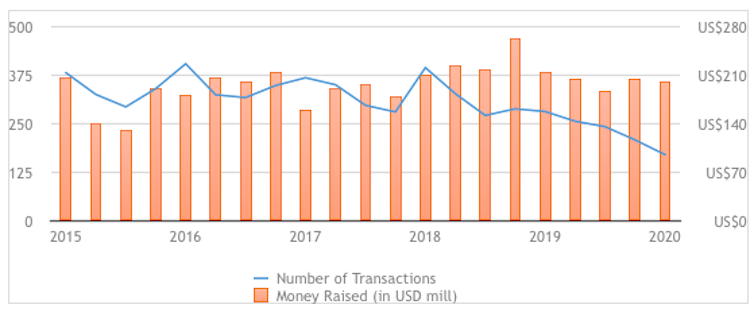
Over the centuries, Chinese entrepreneurs have accessed funds from family and friends through social networks often called . Even after the communist revolution, these networks helped promote a thriving small business sector that invested in local services and basic industrial goods.
In the late Seventies and Nineteen Eighties, when President Deng Xiaoping he began opening of the economy, it didn’t take long to reawaken the innate entrepreneurial spirit that had helped Chinese merchants conquer the old Silk Road. After the rise of tech powerhouse Alibaba, Tencent and Baidu combined with subsequent market liberalizationthere has been a surge in each local and western venture capitalists desperate to find the next generation Chinese unicorns.
China now incorporates the largest venture capital market in Asia, second only to the United States in the world. This is all the more remarkable because China’s communist structure didn’t formally recognize the legality of personal enterprise until 1988.
However, in the face of the Covid-19 pandemic, this extremely necessary source of financing for entrepreneurs has at all times been under serious threat. Unlike banks, which can make business lending decisions based on automated credit scoring, venture capitalists and business angels rely on face-to-face meetings with entrepreneurs to evaluate whether their startups are price investing in.
imm photo
As China was the first country to be negatively affected by Covid-19, we he decided to research how this sector has been affected. We hoped this may help assess what was prone to occur to other economies currently in economic meltdown. The results are not pretty.
What we found
We found that since the outbreak of the coronavirus in China, there has been a dramatic decline in the total variety of investors interested in participating in recent businesses. Across the venture capital spectrum, from investments in brand recent corporations to those already profitable, we saw a 60% decline in the first quarter of 2020 in comparison with 2019.
To put this into perspective, that is three times the amount of decline during the global financial crisis of 2007–2009. Some estimate it if such a decline occurred globally, around $28 billion (£23 billion) of startup funding may very well be lost.
When we looked at seed-stage investment – typically dominated by the smallest and youngest startups – in China, it almost completely disappeared in the first quarter of the yr. In total, fewer than 20 deals were concluded, representing a decline of 86% year-on-year. In other words, startups were almost deprived of latest financing during the crisis.
Seed-stage financing in China 2015–2020

Ross Brown and Augusto Rocha
The sectors that profit most from seed funding in China are education, e-commerce, media and entertainment, healthcare and artificial intelligence/robotics. Most of the money comes from local Chinese investors and this is probably a good barometer of the areas of the economy most affected by the crisis – primarily education and entertainment.
In contrast, larger later-stage venture capital deals are less disadvantageous. This could also be because of the undeniable fact that many deals are financed by foreign-owned investors, often from places affected by the pandemic, only later in the quarter. Significant foreign investors include, among others: Redwood USA, Japan Softbank and Great Britain Baillie Giffordin addition to state funds resembling Qatar Investment Authority.
We also examined which areas in China were most negatively affected. Traditionally, entrepreneurial finance has been concentrated in Beijing, Shanghai and Shenzen, although in recent years investors have expanded their networks across the country. But now there appears to be a worrying weakening. Some of the provinces that have seen the biggest declines in investment are the same ones hardest hit by the virus – Hubei, Zhejian and Hunan.
Most affected provinces, Q1 2020 in comparison with Q1 2019

Ross Brown and Augusto Rocha
The situation in Great Britain
Great Britain relies more on venture capital than most European countries, so our Chinese data raises necessary questions about what’s happening closer to home. Our evaluation shows that there was a marked decline in corporate funds in the first quarter of 2020. As in China, the crisis most affects the youngest and smallest start-ups, although other stages of the investment process have also been affected.
Seed funding in the UK, 2015–2020

Ross Brown and Augusto Rocha
From the chart above, we are able to see that between the first quarter of 2018 and the first quarter of 2020, the variety of seed deals in the UK actually halved. It is possible that this was initially because of uncertainty caused by Brexit and then accentuated by the pandemic.
It is protected to assume that data for the second quarter of 2020 will show further dramatic declines. The uncertainty choking entrepreneurial activity in the UK has already had a huge impact on the economy. Early data shows that the variety of company bankruptcies in March was 70% higher than in the same month last yr, and the variety of start-up registrations dropped by a quarter. It goes without saying that this crisis is unlike any other in modern times.
The UK government did just that launched A a suite of support packages including a £500 million Future Fund and a £750 million fund to support modern small and medium-sized enterprises (SMEs). Importantly, these programs rely on private and public sector co-investment, which can mitigate declines in private equity investment. However, until venture capitalists and business angels are in a position to physically meet entrepreneurs, any such financing will likely remain insufficient.

